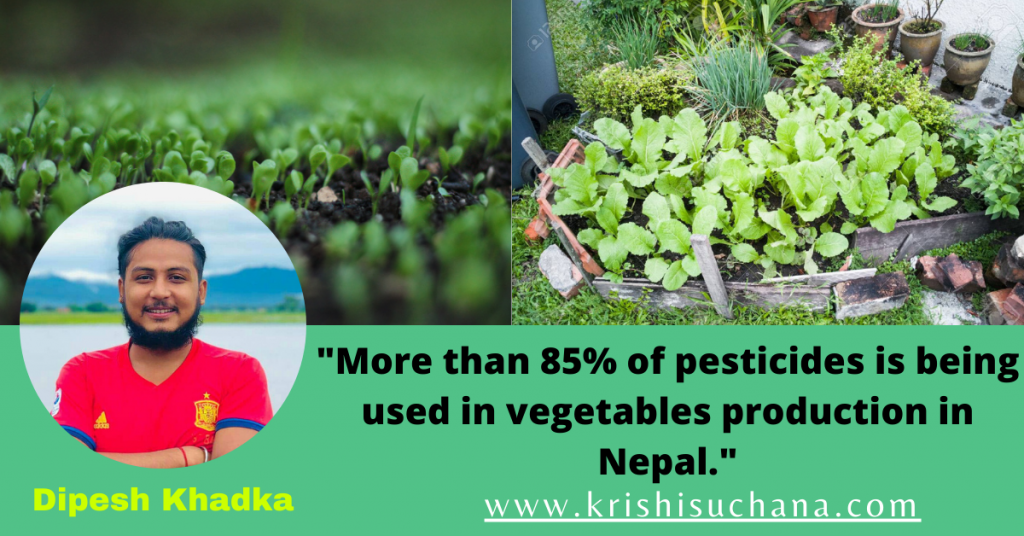One Household : One Organic Garden

The overwhelming rate of population growth rate has been challenging food security sector worldwide. To sort out those challenges science and technologies have developed different crops varieties and crop protection practices to increase production . But In the name of increasing production the technologies had Prioritized using of synthetic chemical products in farming practices.
Technology have been feeding poison instead of nutrition to the people. So pesticides injuries is increasing with days per year of pesticides application. According to the UN reports of health survey Pesticides poisoning annually kills a 200000 lives on which Overwhelming majority of those killed are farmers in developing countries. It had to again lead technologies to search about techniques in production without use of chemical compound.
So trend of organic farming is now more prior in response with health conscious activities. But the production process in organic farming is relatively costly than in conventional practices of production. In developed countries whose farming technology and capacity is much efficient they can afford the cost of production process . But what will be alternative for developing countries like our is today most concerning questions in recent days.
Nepal is least developed countries with low per capita income .
Though it is agricultural country , It could not fulfill its own food requirement annually. According to the Department of Customs, Nepal imported farm products worth Rs215. 50 billion in the last fiscal year of 2018/19. It is in increasing rate annually. So In this situation organic farming be reliable in present circumstances or not. The food insufficiency problem is one of the major challenges in Nepalese food security sector . Almost 30 districts are under nutrition in Nepal . There is still cloud of hunger in Nepalese food sector .
As well people have low income source in average . With view of this circumstances Nepalese people cant afford organic shifting in Country. Nepalese people utilize rice , wheat , maize and barley as main staple crops . The organic practices in recent context is very unreliable and impossible . We are still facing food insecurity problem in our staple crops . Although Following conventional farming , Nepal have to import huge amount of staple crops from India of worth Rs.40.21 billion in last fiscal year .And if there is organic shifting in the staple crop production then Nepal will have to suffer prior from hunger and price hiking rather than long term pesticide poisonings So there have to be alternative of organic shifting .
With this views In recent Nepalese context organic initiation will be best rather than holistic organic shifting of farming practices. On the contrary One household one organic home garden policy will be best alternative to recent context . Individual household can start from their own home garden. The recent data shows 3.17a.i kg of pesticides is being used in vegetables farming per ha. Which is very large than cereal crops .
More than 85% of pesticides is being used in vegetables production in Nepal. So at first the organic initiation should start from organic vegetables production rather than cereal crops. So The production of organic vegetables in own household could ensure less use of pesticides which ultimately reduce pesticides utilization in horticultural sector of country. Majority of people in Nepal lives in rural (about 82.7%) follows subsistence type of farming . So there is huge potential of one organic garden in one household for organic production of fruits and vegetables.
The waste from houses as well as compost manure from subsistence livestock farming would be enough to utilize them as a organic manure for organic garden. This will ensure people to have at least organic vegetables in their daily diet . . So with the recent Nepalese context there needed to be initiative toward organic farming not holistic shifting in overall agriculture . Our economic structure still cant afford holistic organic farming practices just in recent moments. So initiative of organic practices should start from individual home garden .
The government should make structural and institutional changes to amend this policy. Provision of seeds, training on manufacture of organic manures , organic cultural practices through extension services should initiate. One household one organic garden will ensure less import of pesticides . Almost 635 tones worth of Rs830 million pesticides was imported in last fiscal year in Nepal . So huge amount of savings can be made from this initiation. If all household would produce organic vegetables then country would be independent from import of vegetables which is about 3 million tons annually .
As well the surplus organic produce from all household in rural area could ensure organic vegetables to rest of 18 % urban population . People will be influence toward organic farming and production later on after growing trend of organic garden in every household .With this regard instead of holistic shifting in organic practices in farming organic initiation from one household one organic garden would be best alternative as well as best method to influence people toward organic farming in our country in recent context.
Writer: Dipesh Khadka (Bsc Ag 6th sem, College: IAAS Lamjung campus TU)

